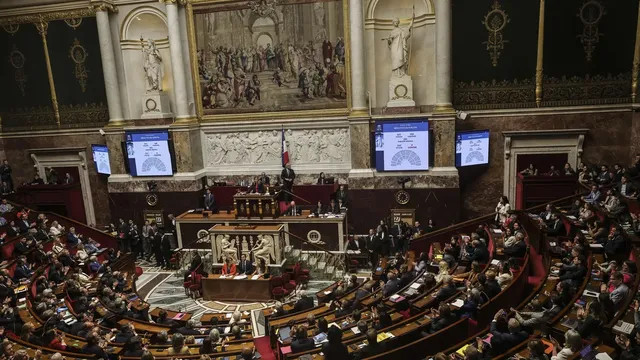French senators are beginning debates on the historic fast fashion law, which could change the way ultra-cheap clothes are sold and advertised.
However, environmental organizations fear that the proposed law has been significantly weakened compared to its original version, Radio France International reported.
French citizens buy an average of 48 new clothes per person per year, but two-thirds of them remain in the wardrobe, while the rest are thrown away and pollute the environment. According to Ademe, the French environmental agency, 35 clothes are thrown away every second.
On June 2, lawmakers in the upper house began debating a proposed law to “reduce the impact of the textile industry on the environment,” which is estimated to be responsible for 10% of global greenhouse gas emissions.
In March 2024, lawmakers voted unanimously to define and regulate imports of cheap, fast-moving clothing, known as ultra-fast fashion, offered by Chinese online retailers such as Shein and Temu.
“Today, these ultra-fast fashion giants are flooding the market without any control. We need to establish rules and enforce them as effectively and strictly as possible,” said Silvie Valente Le Hir, a senator from the conservative Republican Party and rapporteur for the bill.
Under the legislation, the legal definition of “fast fashion” will be based on factors such as production volume, product life cycle, and repairability.
Companies falling under this definition will be subject to new obligations, including environmental transparency and potential penalties through a system of bonuses and penalties indexed to eco-labelling. It will reward virtuous production methods and impose sanctions on companies that engage in fast fashion practices leading to waste.
Weakened proposals
However, following amendments introduced by a Senate committee in February, the text presented to senators is weaker than the original.
The proposed advertising ban will now only apply to influential figures, after senators said it could infringe on economic freedom.
Environmental labeling as the basis for the bonus and penalty system has also been dropped.
For Impact France, a non-governmental organization that led the effort to pass the law, the latest version is no longer in line with France's environmental transition goals.
“What made the first version of the text so powerful was that it contained two measures that worked well. The first was a ban on advertising, and the second was a bonus and penalty system based on the environmental impact of clothing,” said Impact co-chair Julia Four.
“The combination of these two measures made it possible to change the paradigm in the textile industry. If you remove half of the measures, the effectiveness of such a text is reduced by half,” she added.
Protecting business in France
The amendments are the result of intense lobbying by Shein before the French parliament. The Chinese giant hired former minister Christophe Castaner as a consultant. French media reported that Castaner presented himself to MPs as a defender of low-income consumers.
The bill now mainly targets Asian giants in the ultra-fast fashion sector, such as Shein and Temu. Critics such as the Stop Fast Fashion coalition fear that this could turn the legislation into an “empty shell with no deterrent effect” by exempting large European and French fast fashion platforms from liability.
However, Senator Sylvie Vallaud of the conservative Republican Party defends the idea of excluding European fast fashion chains.
“Ephemeral fashion brands such as Zara, H&M, and Kiabi are found in our shopping malls and city centers. And these brands and stores pay their taxes and employ people. ”I'm not going to turn the entire textile industry green with such a bill. However, we are taking advantage of this opportunity to influence the biggest Chinese giants, and then we will work at the European level," she said.
The European Commission is considering introducing a tax on small shipments entering the EU, most of which come from China. At the end of May, it called on Shein to comply with EU consumer protection laws and warned that it could face fines if it did not address EU concerns about the sale of dangerous products on the Shein and Temu websites.
Impact France is calling for the reinstatement of four key provisions in fast fashion legislation: eco-labelling, the inclusion of multi-brand platforms, a total ban on advertising, and the extension of producer responsibility at the international level.
“The fashion industry needs rules that reflect the scale of its impact. We have an opportunity to set a global standard, and France must not miss it,” said Four.
Although the Senate opposes a total ban on fast fashion advertising, the government has announced that it will try to reintroduce it into the bill with the support of the left. | BGNES

 Breaking news
Breaking news
 Europe
Europe
 Bulgaria
Bulgaria







